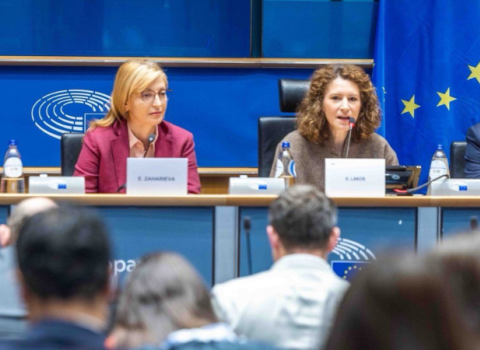Horizon Europe space research partnership was brutally cut after member states failed to back the plan. Now industry partners have to decide if it is worth going ahead or not

The proposed Horizon Europe space research partnership, designed to drive EU competitiveness in the global market, is once again in disarray after EU member states and the European Commission cut its scope and ambition.
The partnership was due to get off the ground in June, along with eleven other research partnerships between industry and the EU, but member states refused to give the go-ahead at that point, prompting prolonged negotiations with the Commission.
The initial plan was to invest between €1.4 to €2.2 billion of industry and EU money, but the talks ended last month with EU member states slashing the budget to a mere €250 million.
Now, the five industry associations taking part in the partnership have to find common ground and decide whether a much smaller initiative is worth their time. “You can imagine this proposal was designed to achieve consensus among different players that have different objectives for competitiveness. Now, we have to go back to the drawing board,” said Pierre Lionnet, research director at the industry association Eurospace.
With a budget too small to launch any big projects, Eurospace no longer sees much added research value in the partnership. “We don’t see any advantage any more than political. In the end, we believe that the big added value is having the partnership in place, but for the next framework programme,” Lionnet said.
As the next step, the Commission faces the task of revising the partnership deal, including the budget, the role of member states in it, and how long it will last, after which the five associations will have decide whether that is good enough for them.
For industry, reaching consensus might be a difficult task. Eurospace represents companies from 13 European countries, and was pinning hopes on a big partnership addressing all their priority areas.
The proposal to support the space industry with EU funds first came up in the European Parliament back in 2016. Eventually, it shifted towards the partnership, which the Commission put to member states in 2019. Talks have been ongoing ever since.
While the Commission is dead set on having a partnership with industry, member states are not convinced they want public money going to companies.
This is a hangover from the fact that traditionally, space has been public sector-driven. When it comes to developing launchers and satellites, the bread and butter of the industry, 60% of the European market is still driven by publicly-funded institutions, while the rest of the market, including exports, is occupied by industry. “We want the partnership to support that 40% of the business,” said Lionnet.
In the US, there is a shift to an industry-led approach, with the US space agency NASA now procuring both hardware and services from industry. “Today, we have the impression that member states keep seeing space as exclusively an institutionally-driven business and want to make sure that most of the [funding] supports innovation and research for institutional programmes,” Lionnet said. While that is a valid political point of view, it may be detrimental to Europe’s commercial prospects in the space market.
Difficult task
For SME4Space, an association of small and medium sized enterprises, the reduced budget makes the space research partnership less interesting, its director Hans Bracquené told Science|Business. But it’s not a deal breaker, because the critical issue for SMEs is to have a say at the decision making table.
“If we take the €50 million per year and say that roughly 10% of that goes to SMEs, then you are talking about €5 million a year. We are not talking about huge amounts of money,” said Bracquené. For him, the perfect partnership is about bringing all stakeholders together to discuss space policy in Europe, going beyond competitiveness.
Having member states on board, even in a much scaled down partnership means, “it will be a very broad group that will be participating in it, which is again an argument for our position for a contact partnership for the space policy,” said Bracquené. “If you create that specific instrument, why not use it, to at least have that interaction between the Commission and the stakeholders on the overall European space policy?”
For the European Aeronautics Science Network (EASN) representing academia in aviation and space research, the reduced scope means the partnership’s activities are likely to be heavily market-oriented and the needs of research organisations underrepresented.
“Not only for the typical academic society, but also for the research institutions and research organisations, it will be very difficult to involve them in project implementation. Most of these institutions traditionally work on research and development in the pre-industrialisation phases,” said Athanasios Dafnis, member of EASN.
Member states as auditors
One thing the industrial partners do agree on, is limiting the powers of member states in the space partnership.
But the latest agreement with the Commission sees member states having a bigger role in the space partnership than the other industry/EU research partnerships.
The usual form is for an industry to propose a plan to the Commission, which then modifies and implements it. The agreement between the commission and member states, is that member states will contribute to the process, in an auditor-like role. This is a no-go for Eurospace, Lionnet said.
Dafnis agreed. “As far as the involvement of member states in the partnership is concerned, all current partners share the same opinion. Member states should support the Commission in an advisory role, but they should not be a direct authority in the partnership,” he said.
The functions and management of national space agencies differ around Europe, while some countries don’t even have a space agency, says Dafnis. In the end, “We cannot wait for the Commission to reach an agreement with the member states. As I said, the interested partners have all the prerequisites to get the matter rolling.”





 A unique international forum for public research organisations and companies to connect their external engagement with strategic interests around their R&D system.
A unique international forum for public research organisations and companies to connect their external engagement with strategic interests around their R&D system.